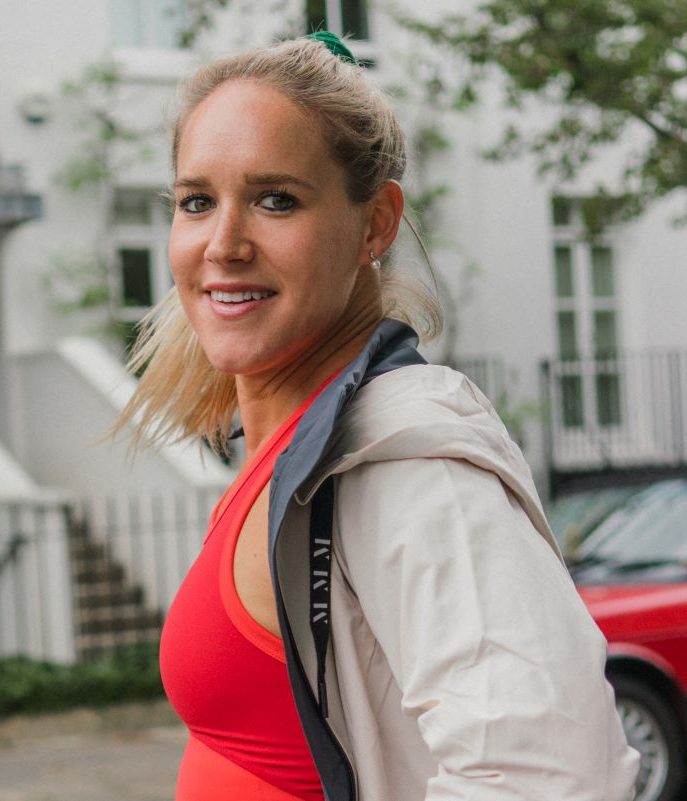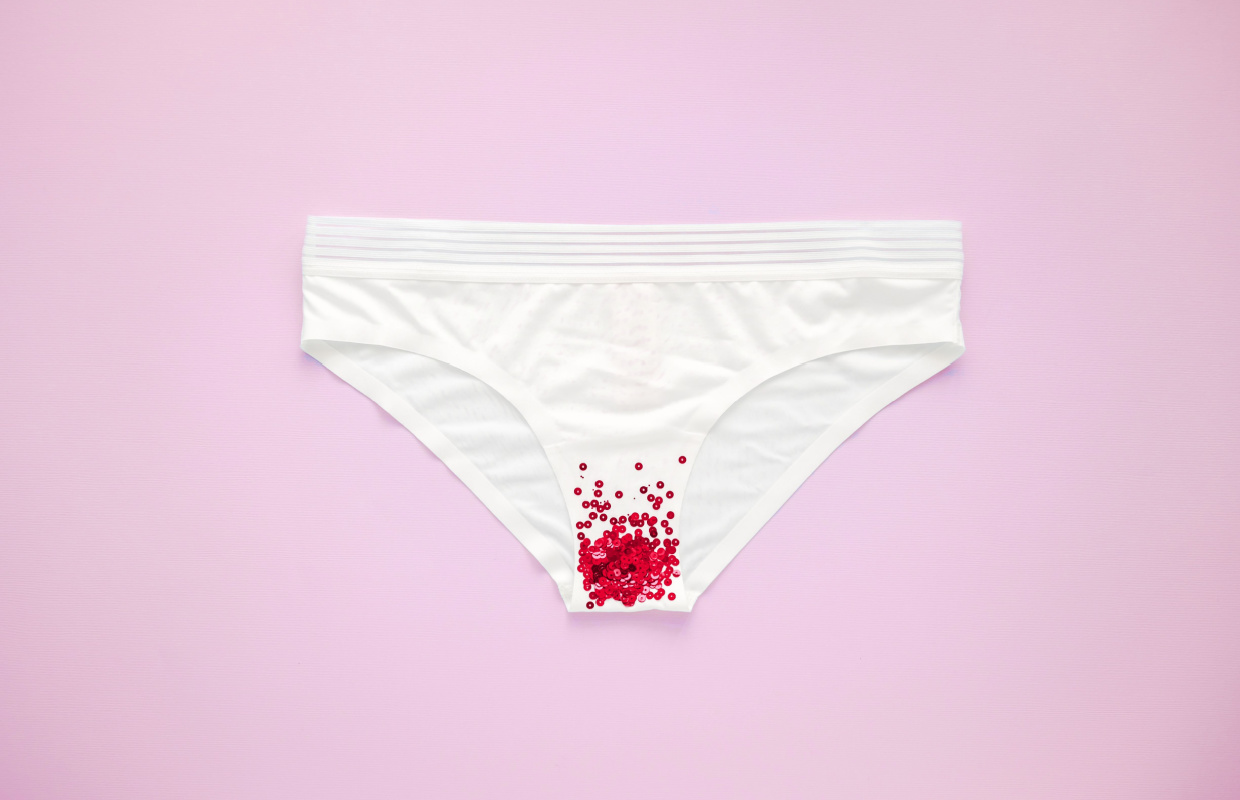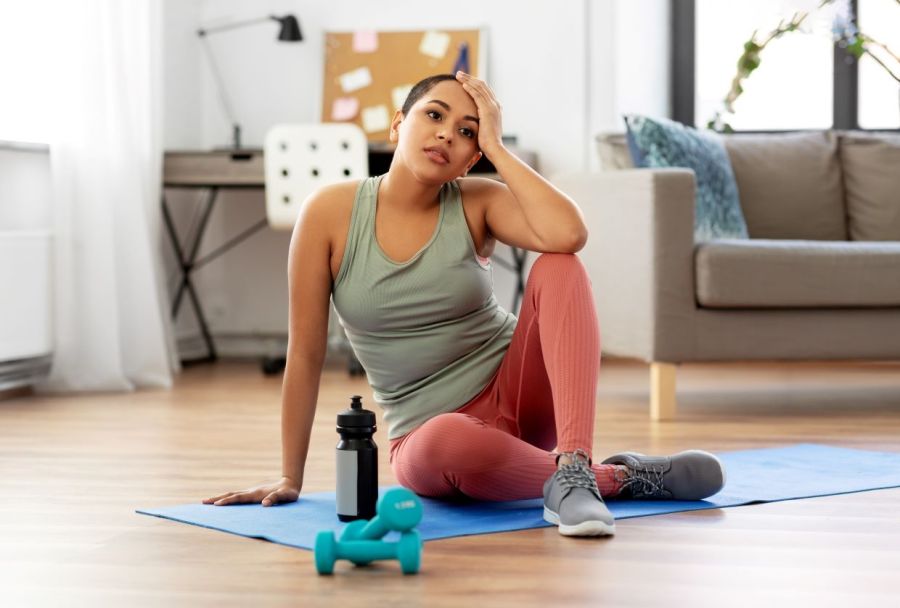
Sarah Campus, personal trainer and founder of LDN MUMS FITNESS
We’ve all been there: you’re just getting ready to head out to a fitness class, when your monthly decides to grace you with its presence. If you’ve been left wondering, ‘can I exercise while on my period?’, then you’ve come to the right place. We caught up with Sarah Campus, personal trainer and founder of LDN MUMS FITNESS, who explains the benefits and risks when it comes to exercising on your period, before sharing the best exercises for easing cramps, along with the activities you should avoid…
If you like to get active every week of the month, the arrival of your period can certainly throw a spanner in the works. For many menstruators, exercise is the last thing you feel like doing during that time of the month – regardless of whether or not the experts say you can. However, if you’re lucky enough to not suffer too badly with cramps, or you’re on a lighter flow day, you might feel like heading out to the gym, trying a yoga class or getting on your bike.
Related: Menstrual cycle workout plan – best exercises for every phase
However, while there are plenty of benefits on offer, there are also some risks involved with working out on your period, and there are certain activities you should try to avoid. Whether you’re concerned about making your flow heavier or you’re completely clueless when it comes to how exercise impacts your hormones, read on for all the answers you need to know when it comes to working out while menstruating…
Note: whether or not you choose to exercise while on your period comes down to you – it’s vital to listen to your body and rest if you need to! Use the advice in this article as a guide rather than a rulebook.
Is it safe to exercise on your period?
Many menstruators feel weaker and more sensitive while on their period. If you’re in this boat, you may wonder whether it’s even safe to put your body under further stress. However, Sarah Campus, personal trainer and founder of LDN MUMS FITNESS, reassures us that exercising while on your period is perfectly safe – as long as you listen to your body.
If you’re experiencing a range of unpleasant symptoms, you should only exercise if you feel able to. ‘Periods can cause bloating, more fluid on board, migraines, fatigue, mood changes, cramping and more – so you may need to adjust your training according to how you feel,’ Sarah explains.
Related: Nutrition & fitness tips for the menstrual cycle phases
Can I work out on the first day of my period?
So, it’s safe to work out on your period – if you feel up to it – but is this only accounting for the lighter flow days? Not necessarily. ‘You can also safely exercise on the first day of your period,’ Sarah explains. ‘However, it is just advisable to listen to your body. You may want to alter the intensity of your exercise, depending on how fatigued you are feeling on the first day of your period.’
Can you do abs workouts during your period?
If you tend to experience cramps during your period, you may be worried about training your abs, in case this leads to greater pain within the area. However, as Sarah explains: ‘You can safely train your abs during your period – but again, it all depends on how you feel.’ If you’re experiencing intense cramps, it might be best to avoid intense core exercises, like crunches.

How does exercise impact your period and hormones?
Exercise affects every aspect of our health and wellness, so it’s no surprise that it can also have an impact on our menstrual cycles. ‘In terms of how exercise impacts your period, like with everything, it’s all about moderation, listening to our body and not overdoing it,’ Sarah explains.
You might’ve heard that female athletes often lose their monthly bleed altogether during intense training periods. As Sarah explains: ‘Excessive exercise could possibly make periods irregular, as experienced by some athletes who train hard regularly. However, on the flip side, a regular fitness routine can positively impact your hormones, to make your periods less heavy in the long run.’
So, how much exercise should we be doing? How much exercise is considered to be ‘excessive’? Surprise, surprise – the answers to these questions will be different for everyone, as no two bodies or cycles are the same. ‘Just be sure to listen to your body and seek professional advice if you have any specific questions for you and your cycle,’ Sarah advises.
Can exercise make your period heavier?
If you’ve previously exercised during your period, and felt like your flow has suddenly become heavier, you’re not alone. ‘Exercise can make a person feel like their flow is increasing, usually because physical activity increases blood flow around the body and can help blood exit the uterus faster.’
If you’re worried about leaking when exercising, be sure to kit yourself out with the necessary products before your workout. ‘Perhaps wear a tampon, pad or cup that is designed for a heavier flow. You could even wear darker underwear and leggings as an extra precaution, in case leaks do occur,’ Sarah adds.
Can exercise make your period come early?
So, if exercise affects your menstrual cycle, can it make your period come early? ‘Nutrition and exercise affect your hormones, and hormones control your menstrual cycle. Therefore, if you’ve recently started a new nutrition or exercise regime, this may cause an early period,’ Sarah explains.
Over time, excessive exercise can also cause changes to your period due to a fast increase or decrease in your weight. ‘Drastic weight gain or weight loss can also seriously change your hormone levels and throw your menstrual cycle off balance. If you have any concerns then consult a health professional,’ Sarah advises.
Related: Menopause nutrition tips for active women
Best exercises to do during your period
As we’ve reinforced throughout this article, when it comes to exercising on your period, it’s all about listening to your body and doing what’s right for you. However, in general, it’s usually best to stick to lighter forms of exercise when you’re menstruating. As Sarah explains: ‘It’s better to avoid the high intensity and contact exercises. Instead, try incorporating the following activities into your training schedule’:
- Light walking
- Gentle yoga (avoid upside down poses)
- Low volume strength training
- Power activities
Try this: Rest day workout – Low intensity stretch circuit

What are the best exercises to relieve period cramps?
According to Sarah, gentler forms of exercise can also help to ease period symptoms, like cramping and bloating: ‘Light walking, yoga and gentle stretching can all help to reduce bloating and cramping pains. Plus, the endorphin release from light exercise acts as a natural pain reliever to ease discomfort, while also boosting your mood.’
Benefits of exercising during your period
If you need more reasons to get moving during your period, check out these key benefits:
- Reduce stress
- Boost your mood
- Enhance blood circulation
- Reduces cramping and bloating
- Beats fatigue and headaches
- Regulates irregular periods
Related: Fitness during pregnancy – how to exercise safely
Which exercises should I avoid during my period?
Exercising during your period certainly offers a range of benefits for your health and wellbeing. However, this doesn’t mean you should be aiming for any PBs or heading out to an intense HIIT class. As Sarah explains: ‘During your period, you should try to avoid strenuous or prolonged exercise. You should also refrain from inversion-type yoga poses and crunching exercises. Anything that doesn’t feel right for your body, or makes you feel dizzy, stop immediately.’
Can I exercise on my period?
In summary, it’s vital to listen to your own body and get to know which exercises feel good while on your period. Generally speaking, it’s best to stick to light forms of exercise, like yoga, walking and low-intensity strength training while menstruating. However, if you feel up to doing more, then follow your body’s lead! Just make sure you allow yourself plenty of time to rest and recuperate, too.
Related: Breaking barriers: 5 sportswomen share their fitness tips







